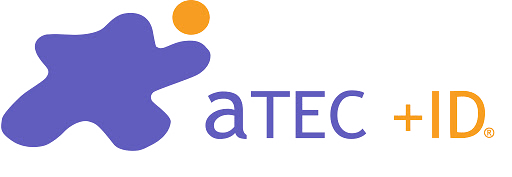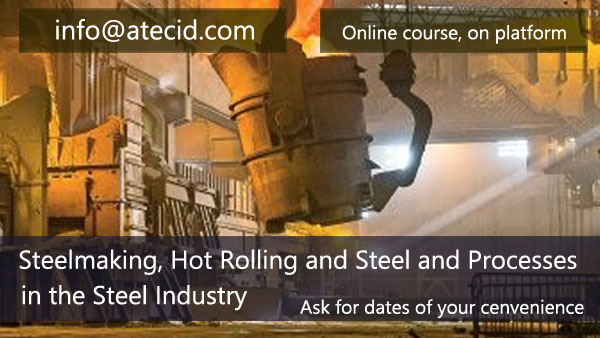Este curso aborda tanto los procesos productivos como aquellos procesos de la industria siderúrgica, tanto de la ruta integral como de la ruta eléctrica EAF, que son necesarios para el desempeño de cualquier empresa, como mantenimiento, compras, RRHH, comercial, marketing, control de gestión, utillaje, etc, pero descargado de complejidad técnica y orientado a perfiles Técnico-Administrativos. Contamos también con la inestimable colaboración de Germán Ghiotti, profesional tanto del sector siderúrgico como de la docencia, Ingeniero de Materiales y estudios en C. Físicas, con amplia experiencia en Votorantim Acerbrag (Argentina) y Gerdau (Argentina y Brasil).
This course addresses the contents of most of all main activities of an steel plant with steelmaking and hot rolling facilities. These contents, though technical, have been designed fot Technical-Administrative profiles. The intention is not to avoid technical content but making it more accesible to such profiles, including other processes needed and in constant conteact with the Steelworks and Rolling Mill. This is the result of the industry needs to provide training to employees and workers.
Training is not only of interest to new professionals in the sector, but it is mainly of interest to senior professionals, who find an opportunity to acquire new points of view on technical issues and new methods and ideas on how to analyze their particular case, or how to project new projects and ideas, recycle or get a company award. We find also professionals with management or leadership functions, for whom it is important to contemplate all areas of the activity, maintenance, Lean management, continuous improvement, new projects, etc. . , and even to understand the costs.
The course takes place in our online training platform, and live contact by videoconference can be asked to be held. This does not mean that quality is lost, rather on the contrary, this modality is ideal for this type of content in which it is necessary to understand formulas and effects, since it allows a progress through the course, adapted to each person.
This course provides a “book of the course” (pdf format) as you advance in the course or at the end.
The structure of the course, which can be read in more detail in the course sheet (link below), is as follows::
Module 1: Vision of the Steel Industry
After reviewing several fundamental issues of the sector at the market level, along with its current circumstances and future trends, a general description of the sector and the intergal manufacturing routes and the EAF steelmaking route are made ( Electric Arc Furnace) as fusion routes, and then the steps that are already common, such as ladle refining and continuous casting of different sections. The production of flat and long products is also addressed. Any steel company is focused on efficient production.
The steel sector is one of the largest global sectors and markets, important in all economies, both developed and developing, where the energy-environmental aspect has always been key, and at this time even more so, and therefore the participant will obtain a review on this topic.
Module 2: Steel melting processes
This module addresses the primary route (Blast Furnace + Converter Furnace, or BF-BOF route) on the one hand, and the EAF melting furnace electrical route on the other. Most of the world’s steel is manufactured by the primary or integral route, but decarbonization needs are posing the migration of this route to a hybrid of integral-EAF, which is the obtaining of DRI from iron ore and its use in EAF. DRI is already used in EAF, there are many companies that use it, or are going to incorporate it, which is why this aspect is mentioned both in the introduction and here.
In this module, the study of these processes, facilities and operations is carried out, freeing the participant from technical aspects that are not necessary. The participant will be able to learn about the different aspects, about compositions, temperatures, process steps and issues that influence quality, productivity and costs, and how the fusion process is linked to the preparation of the refining.
Module 3: Ladle Refining Furnace
The participant will obtain a description of how the fusion phase links with the refining or ladle refining phase, desulfurization, deoxidation, additions and alloying, decarburization, temperature, control of slag and inclusions, refractories, etc., and how prepare the heat.
Module 4: Continuous Casting
This part addresses the entire continuous casting process, what influences the quality of the resulting product, cleanliness, inclusions, surface quality, cracks, internal quality, solidification, segregations, etc., as well as the facilities and their operations.
Module 5: Hot Rolling
This part addresses the hot rolling processes of flat and long products, with a description of what the process is like, what functions are performed and how an efficient and highly productive process can be obtained, including the tooling functions (tooling department). cylinders) and Laboratory.
Module 6: Adjacent processes to production
As stated, although production is key, there are other important departments, such as Maintenance and Technical Office, Innovation, Quality, Environment, HR, Purchasing, Financial and management control, or other departments that are established due to structural needs, corporate, or other needs, where it is convenient to know what a steel company does, and how the different functions, processes and activities complement and coordinate. This aspect is one of the most important objectives of this course, where it is intended to provide a vision that many professionals are unable to obtain clearly, for very different reasons, especially the distance from the factory, the difficulties in getting to know it well, or the absence in its location, of certain departments and functions.
Enrolment and Price
Enrolment will be open till last day.
- The price is 900 € per person.
- Payment must be made before the course starts
- You can use our Registration Form , enrollment is continuous so you can take the course any time you want. Once started you will have three months to complete it.
The participant will receive a username and password to access the course in our training platform on the same day it starts, or usually a few days before.
It is necessary to have a PC or MAC computer, or a mobile device type tablet or smartphone with internet access to take the course.
The participant will receive a diploma or certificate at the end of the course. To obtain a diploma of achievement, it will be necessary to have completed at least 75% of the contents and have passed 50% of the evaluation tests, and to obtain a certificate of attendance it will be necessary to have completed 75% of the contents and have attended at least 25% of the planned course hours.
We appreciate the dissemination of the information about this course.
You can access the
Ver ficha del curso



